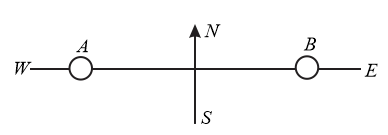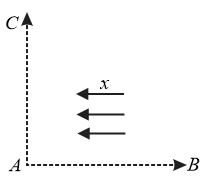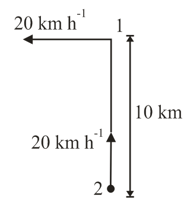B M Sharma Solutions for Chapter: Kinematics II, Exercise 76: CONCEPT APPLICATION EXERCISE 5.5
B M Sharma Physics Solutions for Exercise - B M Sharma Solutions for Chapter: Kinematics II, Exercise 76: CONCEPT APPLICATION EXERCISE 5.5
Attempt the practice questions on Chapter 5: Kinematics II, Exercise 76: CONCEPT APPLICATION EXERCISE 5.5 with hints and solutions to strengthen your understanding. PHYSICS For Joint Entrance Examination JEE (Advanced) Mechanics I solutions are prepared by Experienced Embibe Experts.
Questions from B M Sharma Solutions for Chapter: Kinematics II, Exercise 76: CONCEPT APPLICATION EXERCISE 5.5 with Hints & Solutions
An aeroplane flies along a straight path to returns back again. The distance between and is and the aeroplane maintains the constant speed with respect to the wind. There is a steady wind with a speed at an angle with line . Determine the expression for the total time of the trip.

A pilot is supposed to fly a certain distance , due east from to and then due west from to . The velocity of plane is and that of air is . The time for the round trip is in still air. Show that

(a) If the air velocity be due east or west, the time for the round trip will be
(b) if the air velocity is due north or south, the time for a round trip will be
Wind blows with a velocity in the direction shown in the figure. Two aeroplanes start out from point and fly with a constant speed . The first flies from to . Both of them return to . If , which plane will return to point first, and what will be the ratio of the times of flight of the two planes?

Two ships are apart on a line joining south to north. The one farther north is streaming west at . The other is streaming north at . What is their distance of the closest approach? How long do they take to reach it?

A boatman finds that he can save in crossing a river by the quickest path than by the shortest path. If the velocity of the boat and the river be, respectively, and , find the river width.
A man directly crosses a river in time and swims down the current at a distance equal to the width of the river in time . If and be the speed of the current and the man, respectively, show that .
A person rows a boat across a river making an angle of with the downstream. Find the percentage time he would have saved, had he crossed the river in the shortest possible time.
A person, intending to cross a river by the shortest path, starts at an angle with the downstream. If the speed of the person is less than that of the water current, show that must be obtuse.
